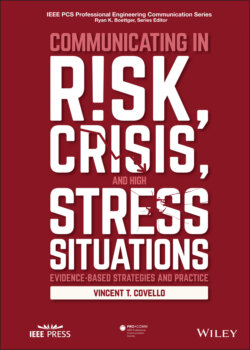Читать книгу Communicating in Risk, Crisis, and High Stress Situations: Evidence-Based Strategies and Practice - Vincent T. Covello - Страница 14
1
The Critical Role of Risk, High Concern, and Crisis Communication CHAPTER OBJECTIVES
ОглавлениеThis chapter addresses the role – and necessity – of successful communication in situations involving risk, high stress concerns, or crisis. It describes the book’s intent to serve both as a handbook for individuals and as a resource for training and education. At the end of this chapter, you will be able to:
describe the professional value of learning about risk communication principles and skills,
identify how recent changes in the social and technical environment affect communication practices, and
relate the organization and contents of this book to your individual needs.
The single biggest problem in communication is the illusion that it has taken place.
—George Bernard Shaw
This book is about communicating with people in the most challenging circumstances: high stress situations. The ability to communicate effectively in a high stress situation is an essential communication competency. It is a competency that differs in significant ways from other generic communication skills. If done well, it can build trust and agreement, enabling beneficial solutions and constructive behaviors even in the face of fear and anxiety. In a public health or environmental hazard situation, it can save lives. Poor communication in high stress situations can have disastrous consequences, whether the loss of a business or the failure to resolve a high impact policy or operational issue. Professionals in every field can be thrust into situations demanding specialized high stress communications skills, whether they are confronting an external crisis or leading organizational change. I wrote this book so that you can be prepared.
As a manager or technical professional, you likely have a logical, research‐based approach for addressing complex issues. You strive to ensure that people and communities benefit from this expertise. Yet all too often, the individuals and populations you serve do not share your trained perspective and thought processes; they do not consider your facts, judgements, and decisions persuasive, especially in situations fraught with high concern.
Enabling technical expertise to inform decisions and policy outcomes requires a body of well‐researched knowledge and trained skills in risk, high concern, and crisis communication. Without this knowledge and related skills, the negative consequences can be major.
